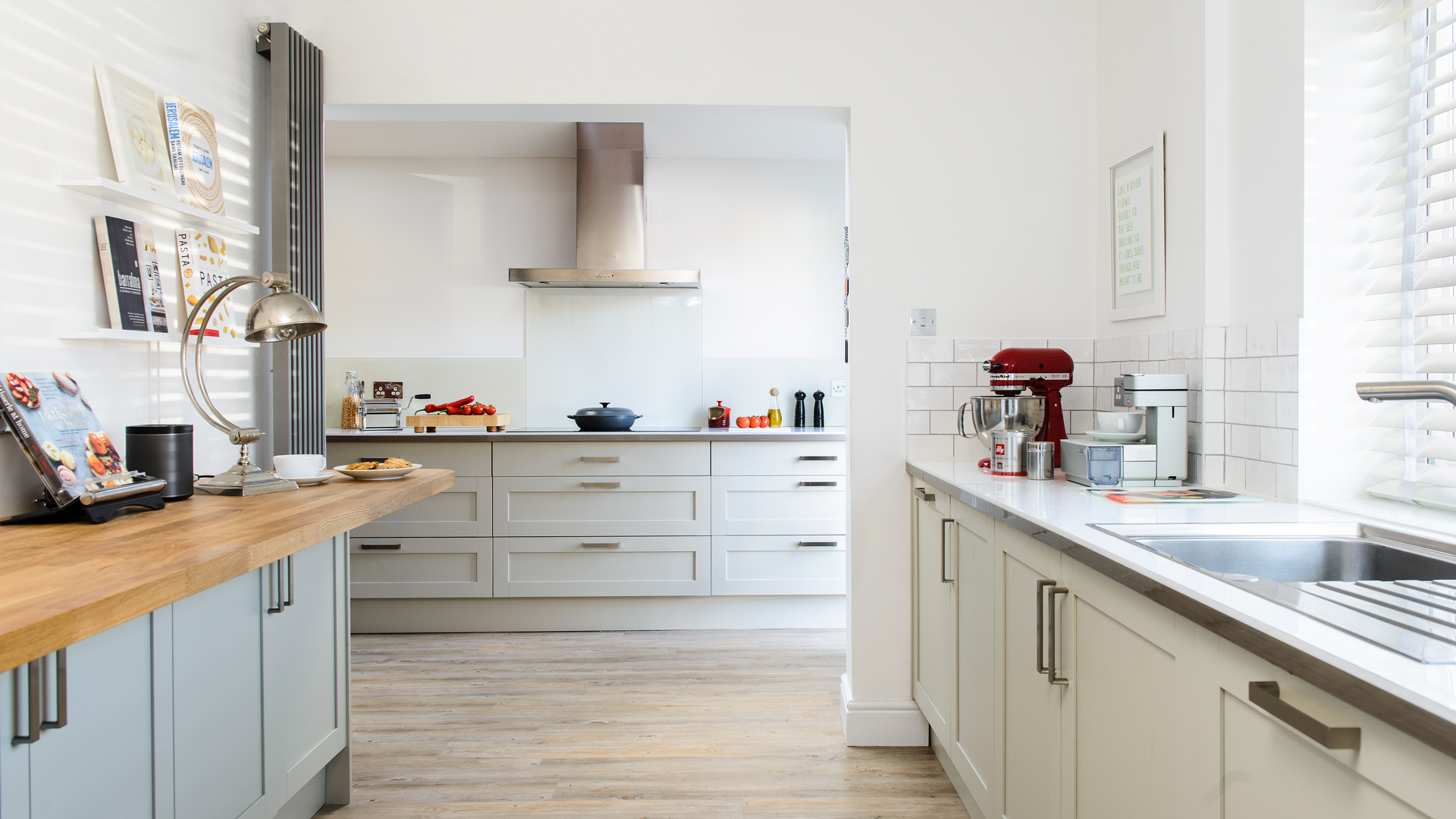How to improve air quality in your home: 9 easy steps to cleaner air
Make pollutants, allergens, and air-borne irritants a thing of the past by following these simple steps on how to improve air quality in your home

Tamara Kelly
We spend a large majority of our time indoors, where the quality of the air we breathe is just as important as the air we breathe when we go outside – meaning knowing how to improve air quality in your home is essential knowledge.
While we can try and shut the windows to road traffic and other fumes from the outside world, there are allergens and other irritants that can cause problems indoors.
As well as pet dander, pollen, and dust, consider things such as moisture (or dampness) that can lead to mold. While many might consider these to be seemingly small problems, for people suffering from asthma or immune system conditions they can have a real impact on health.
The good news is that it’s easy to address all of those potential problems. Better still, as you’re about to discover, as well as learning how air purifiers work and the benefits you get from using an air purifier, some of the best ways to improve air quality at home are free.
How to improve air quality in your home
"We spend around 90% of our time indoors, yet indoor air can be up to five times more polluted than outside," explains Alexander Provins, Director EMEA, Blueair. "Indoor air is made up of a concoction of particles including dust, mould, smoke, bacteria, viruses, VOCs, and pet dander."
"Other indoor activities, such as cooking and cleaning with chemicals, contribute to poor indoor air quality along with outdoor pollution from transport that makes its ways inside. This causes a build-up of pollutants indoors, taking much longer to disperse than outdoor air pollution due to poor ventilation."
1. Open windows

By letting fresh air circulate you can make an instant difference in the quality of the air in your home. Just five to ten minutes a day can make a noticeable improvement.
Sign up to our free daily email for the latest royal and entertainment news, interesting opinion, expert advice on styling and beauty trends, and no-nonsense guides to the health and wellness questions you want answered.
"Open windows regularly," suggests Alexander, "your indoor air is on average five times more polluted than the outside air and natural ventilation is the best way to improve indoor air quality."
On cold winter nights though, close the bedroom window; too much constant, icy air could be bad for your chest.
2. Vacuum reguarly
One of the simplest ways to improve the quality of the air in your home is to increase how often you vacuum, ideally with a vacuum cleaner that has a HEPA filter (one that’s washed or replaced regularly). This will get rid of dust and/ or pet dander.
You should also regularly wash bedding, clean any surfaces that come into contact with pets, and make a point of cleaning corners where mold may grow.
3. Nurture indoor plants

The biophilic interior design trend is not only one that welcomes greenery to indoor color palettes, it's one that can also help to improve the air quality in our homes.
When looking at what plants to buy online to tackle how to improve air quality in your home consider popular Spider plants. "Spider plants are widely considered to be one of the easiest air-purifying plants to grow at home," explains Fiona Jenkins, gardening and plant expert at MyJobQuote.
"Not only do these plants remove harmful chemicals from the air, but they are also rumored to bring good luck and good health to your home too." Using crystals in the home is another alternative way to welcome a sense of well-being, it won't improve air quality but it can certainly aid the ambiance.
4. Invest in an air purifier
Effectively vacuum cleaners for the air, the best air purifiers for allergies, and the best air purifiers for dust will capture some of the allergens and irritants that can trigger allergic symptoms.
"A lot of people are under the impression that air purifiers are only needed by those who suffer from allergies," says Alexander. "However, ample evidence links air pollution to asthma, autism, chronic chest problems, and stunted lung development, as well as a decline in mental and cognitive health. This is likely to have a huge impact on generations to come."
An air purifier won’t eliminate all of the problems – they’re best suited to capturing things such as dust and pollen – but they can remove enough irritants and allergens to make a pretty significant difference to improve the air quality in your home.
5. Opt for a dehumidifier
If you’ve got a problem with condensation, a dehumidifier can be a good investment. Removing moisture from the air can be a very effective way to reduce mold growth.
Additionally, a good extractor fan near your shower (if you don’t already have one installed) is another wise buy.
6. Use an extractor fan

Cooker hoods and kitchen extractor fans shouldn’t just be reserved for eliminating strong cooking odors or aromas. Did you know that they can also help reduce condensation that’s a by-product of the moisture released by heavily boiling pans, for example?
While you’re at it, crack a window and keep the kitchen door closed – that way the moisture won’t move into other rooms, it will filter straight outside instead.
7. Avoid using chemicals and sprays
An easy and obvious way to improve air quality in your home is to reduce how many chemicals you spritz – some of these may be chemicals that you don't consider chemicals as such.
"Avoid unnecessary chemicals – use natural cleaning products instead," suggests Alexander. You could try cleaning with vinegar instead. "Also cut down on the use of perfume and hair spray."
Even limit how much you are using air fresheners because as well as using the spray to mask an unwanted odor isn’t always wise long-term. Better to try and track down the source of any unpleasant smells, especially as it could be a warning sign of a bigger problem, such as mold.
8. Hang your washing outside
Line drying your clothes is better for the environment and for your purse – the Energy Savings Trust reckons line drying, as opposed to tumble-drying, can save you about £30 a year and reduce your environmental footprint by 90kgs.
Taking your wet and damp washing outdoors is also a big help when it comes to reducing indoor mold. One Scottish study found that 30% of the moisture in people’s homes was a result of drying clothes indoors.
If line drying isn’t an option try the most effective ways to dry your clothes indoors, such as doing so in a well-ventilated room or using a low-energy drying airer or drying cupboard.
9. Reduce smoke

We don’t just mean smoking cigarettes – although smoking indoors doesn’t do great things for air quality – we mean anything that produces smoke. Lighting your best-scented candles might be romantic and relaxing, but excessive burning can waft a lot of particulate matter, such as soot, into the air.
"Avoid scented candles and incense – toxins from paraffin candles are the same as those in diesel fumes," warns Alexander. "Also avoid log burners and open fires as far as possible – particularly if you have small children."
Consider looking for alternative ways to keep your home warm this winter to reduce the amount of time you need to light the fire.
Can poor indoor air quality make you sick?
To explain how poor indoor air quality can make you sick Alexander explains, "breathing in fine dust or PM2.5 (also known as fine particulate matter) can penetrate deep into the lungs and cause respiratory difficulties, heart and lung problems, and a host of other diseases."
"Indoor air can also affect other parts of the body in addition to the respiratory system. Atmospheric factors such as air pollution have been implicated in premature skin aging – this includes air pollutants such as smog, ozone, and particulate matter. Studies also show a correlation between higher levels of PM2.5 and air pollution with the increased number of people suffering from skin problems such as pigment spots and wrinkles, hives, and eczema."
Did you know the quality of your indoor air can help you sleep better? "Polluted indoor air can also affect your sleep," Alexander explains. "Clean air helps to promote deep sleep, and people who live in areas with higher levels of air pollution are 60% more likely to sleep poorly than those living in areas with cleaner air. Repeated exposure to poor indoor air quality - especially in an enclosed space with poor ventilation - can bring on headaches, fatigue, dermatitis, and more – many of the same symptoms often used to diagnose Sick Building Syndrome (SBS)."
Alexander concludes by saying, "clean air is extremely beneficial for your health so it’s important to combat indoor air pollution in the long term."
Writer and broadcaster Carrie Marshall has been writing about all kinds of technology since 1998. Carrie’s CV is a who’s who of magazines, newspapers, websites and radio programs ranging from T3, Woman & Home, Techradar and MacFormat to the BBC, Sunday Post and People’s Friend, and she offers straight-talking tech advice on BBC Radio Scotland every Monday. Carrie has also written thirteen non-fiction books and ghost-written two more, and she has also been the co-writer of seven books and a Radio 2 documentary series. Her memoir, Carrie Kills A Man, will be published in late 2022.
- Tamara KellyLifestyle Editor